- Home
- Charles L. Grant
Jackals
Jackals Read online
JACKALS
By Charles L. Grant
A Macabre Ink Production
Macabre Ink is an imprint of Crossroad Press
Digital Edition published by Crossroad Press
Smashwords edition published at Smashwords by Crossroad Press
Digital Edition Copyright © 2018 Kathryn Ptacek
Previous publication by Necon E-books – 2011
Cover by Jill Bauman
LICENSE NOTES
This eBook is licensed for your personal enjoyment only. This eBook may not be re-sold or given away to other people. If you would like to share this book with another person, please purchase an additional copy for each person you share it with. If you’re reading this book and did not purchase it, or it was not purchased for your use only, then you should return to the vendor of your choice and purchase your own copy. Thank you for respecting the hard work of this author.
Meet the Author
Photo by Jeff Schalles
Charles L. Grant taught English and history at the high school level before becoming a full-time writer in the ’70s. He served for many years as an officer in the Horror Writers Association and in Science Fiction Writers of America.
He was known for his “quiet horror” and for editing the award-winning Shadows anthologies. He received the British Fantasy Society’s Special Award in 1987 for life achievement; in 2000, he was the recipient of the Lifetime Achievement Award from HWA. Other awards include two Nebula Awards and three World Fantasy Awards for writing and editing.
Charlie died from a lengthy illness on September 15, 2006, just three days after his birthday. He lived in Newton, NJ, and was married to writer/editor Kathryn Ptacek for nearly twenty-five years.
Book List
Horror
Novels
Black Oak: Genesis
Black Oak: The Hush of Dark Wings
Black Oak: Winter Knight
Black Oak: Hunting Ground
Black Oak: When the Cold Wind Blows
Fire Mask
For Fear of the Night
In A Dark Dream
Jackals
Millennium Quartet #1: Symphony
Millennium Quartet #2: In the Mood
Millennium Quartet #3: Chariot
Millennium Quartet #4: Riders in the Sky
Night Songs
Raven
Something Stirs
Stunts
The Bloodwind
The Curse
The Grave
The Hour of the Oxrun Dead
The Last Call of Mourning
The Nestling
The Pet
The Sound Of Midnight
The Tea Party
The Universe of Horror Trilogy
The Soft Whisper of the Dead
The Dark Cry of the Moon
The Long Night of the Grave
Collections
Dialing the Wind
Nightmare Seasons
The Black Carousel
The Orchard
Science Fiction
A Quiet Night of Fear
Ascension
Legion
Ravens of the Moon
The Shadow of Alpha
As “Geoffrey Marsh”
The Fangs of the Hooded Demon
The King of Satan’s Eyes
The Patch of the Odin Soldier
The Tail of the Arabian, Knight
As “Lionel Fenn”
The Quest for the White Duck Trilogy
Blood River Down
Web of Defeat
Agnes Day
The Kent Montana Series
The Really Ugly Thing From Mars
The Reasonably Invisible Man
The Once and Future Thing
The Mark of the Moderately Vicious Vampire
668, the Neighbor of the Beast
The Diego Series
Once Upon a Time in the East
By The Time I Get To Nashville
Time, the Semi-Final Frontier
The Seven Spears of the W’dch’ck
As “Simon Lake”
The Midnight Place Series
Daughter of Darkness
Death Cycle
He Told Me To
Something’s Watching
As “Felicia Andrews”
Moonwitch
Mountainwitch
Riverrun
Riverwitch
Seacliffe
Silver Huntress
The Velvet Hart
As “Deborah Lewis”
Eve of the Hound
Kirkwood Fires
The Wind at Winter’s End
Voices Out of Time
DISCOVER CROSSROAD PRESS
Visit us online
Check out our blog and
Subscribe to our Newsletter for the latest Crossroad Press News
Find and follow us on Facebook
Join our group at Goodreads
We hope you enjoy this eBook and will seek out other books published by Crossroad Press. We strive to make our eBooks as free of errors as possible, but on occasion some make it into the final product. If you spot any problems, please contact us at [email protected] and notify us of what you found. We’ll make the necessary corrections and republish the book. We’ll also ensure you get the updated version of the eBook.
If you’d like to be notified of new Crossroad Press titles when they are published, please send an email to [email protected] and ask to be added to our mailing list.
If you have a moment, the author would appreciate you taking the time to leave a review for this book at the retailer’s site where you purchased it.
Thank you for your assistance and your support of the authors published by Crossroad Press.
JACKALS
Table of Contents
Chapter One
Chapter Two
Chapter Three
Chapter Four
Chapter Five
Chapter Six
Chapter Seven
Chapter Eight
Chapter Nine
Chapter Ten
Chapter Eleven
Chapter Twelve
Chapter Thirteen
Chapter Fourteen
Chapter Fifteen
Chapter Sixteen
Chapter Seventeen
Chapter Eighteen
Chapter Nineteen
Chapter Twenty
Chapter Twenty-One
Chapter One
Colors mean nothing when the moon is out and a soft breeze dances with the shadows in the woods.
Sparrows get dark, and robins grow darker.
Even blood on a woman turns from bright to
She could see it on the backs of her hands as she walked, dried there, tightening in streaks and blotches across her skin, forming scabs, turning to stone; she flexed the left one to break the forming ragged crust, flexed the right and inhaled sharply when fire raced across the ridge of her knuckles. She clamped her palm to her thigh, pressing hard, grabbing harder, willing the pain to go away, her jaw tight, head trembling, left hand slapping the air in harsh spasms.
Until the fire died, and the blood dried, and she took a stumbling step forward and slowly collapsed to her knees.
She barely felt the night-cool blacktop as it met her, and couldn’t see much beyond it because of the trees. She knew, since she had seen the country in daylight, that there were pastures and fields back there, low rounded hills with spikes of oak, stands of pine, wood fences, stone fences, barbed-wire fences to keep cows and horses from wandering off the grass. She thought she remembered a small, heart-shaped pond with reeds and cattails along one bank.
She couldn’t see it now.
The late August moon was bright, nearly full,
washing the sky with dull silver, but the trees were tight with shadows that danced, and all she could really see was the dark stretch of road ahead, the dark of it behind where it ducked around a curve, curved again, and crossed a creek.
Her head bowed wearily between her rigid arms; she took a breath that hurt her lungs, and another that shuddered when her ribs protested, and she looked up through dark hair that dangled wetly over her eyes. The road topped a low rise long after the trees had fallen away. A house on the other side, she knew it was there. A small place. No luxuries. She didn’t care. She wanted a roof above her.
She wanted to bury the goddamned moon.
Vision blurred suddenly, and suddenly snapped back into focus, and when she shook her head to clear it, an explosion inside made her whimper and filled her stomach with bile. She gasped. She closed her eyes tightly. A finger touched her brow over her left eye, and she sucked in a breath at the fire there, at the dampness.
Doesn’t matter; just a bump; doesn’t matter.
Her feet were bare.
Her jeans were tom at both knees and in a slit across her buttocks.
The shirt she had bought only the day before had ripped along the left shoulder seam, gaped down the left side, and across the front were smears and smudges of dirt and blood, blades of dead grass when she’d fallen before, burrs, and over her right breast a clear handprint made of ash.
She felt the breeze, and it was cool.
She felt the tarmac’s grit against her palms, against her knees, and she tried to rock back, to force herself to stand; it wasn’t that far to the top of the rise, a hundred yards, it couldn’t be more. But she couldn’t move. She was frozen. Nothing worked.
She wanted to run.
Nothing worked.
Her head lowered again and she licked her lips, wiped a forearm over her mouth to get rid of the dirt.
Her elbows quivered with the effort to keep her arms locked.
Stand up; but she couldn’t.
A truck’s going to come, you’ll get run over, stand up.
She tried; she couldn’t.
And she hadn’t seen a car for hours, and that one had been just a flare of headlamps slashing over a hilltop and swerving sharply south and fading. She hadn’t even heard the sound of its engine.
Get up.
I can’t.
Crawl, then; and she did.
Ten yards of pebbles and edges digging into her palms and knees before her right elbow gave out, and she hobbled like a dog that had broken its leg, holding the useless arm across her stomach; ten yards more, fifteen beyond that, and she was on her stomach. Pushing with her toes, the sides of her feet; pulling with her fingers that looked like claws in the soft summer night. Paying no attention to the pebbles and edges that dug into her breasts and belly, scraped along her chin when her neck refused to work.
Pretend you’re in a desert; it isn’t cool, it’s hot, and the sand is pretty soft.
Her lips felt chapped, her tongue felt swollen, and desert or country road, she would kill the next man who tried to stop her from taking a bath. She hated being dirty almost as much as she hated the blood, and when she rested for a moment—she didn’t dare rest any longer—she remembered her mother telling her that young ladies didn’t get dirty, they were soiled, just a little. Just like they didn’t sweat, they only perspired.
remember that, child; young ladies are different.
Her mother was a pain in the ass.
A cough packed with phlegm froze her for a moment, and she gagged, swallowed, and grimaced.
A bird called softly out of the dark, and she realized for the first time how quiet it was out here, how still. The only noise was the stop-and-go scrape of her body against the road, the occasional angry grunt when a hand slipped, a foot slipped, and when the breeze gusted, she could hear the hiss of leaves.
It wasn’t comforting at all.
Another twenty yards and she had to rest again. Her feet had been torn to hanging shreds—she didn’t have to look, she just knew it—and she would have to wait a long time until she could push again without screaming. So she laid her cheek against the warm roadbed and stared across the surface at the trees that lined the far side of the ditch into which the shoulder fell. What were they in this part of the country? she wondered. Oak, she supposed, and some sycamore and maple. Pines? Lots of pines. And pale columns among the dark ones suggested caged and single birch.
She stared so long, things moved back there. Things without shapes that drifted and darted between the boles and fell gently from the branches and grew eyes that stared back and reflected no light.
She blinked quickly, hard, and shifted, staring between her outstretched arms toward the dark line that cut the world into sky and land.
Suppose there’s nothing over there?
What will you do if there’s nothing over there?
She bit down hard on the inside of her cheek, and the spark made her yelp softly; punishment for near surrender.
Don’t be an idiot; there’s a farm, so there has to be a house. If not right there, then close. Think for a minute—didn’t you see it today? Didn’t you see the house just over that hill?
When you were running?
No.
She bit down again.
I don’t remember.
Fair enough, the breeze told her; fair enough.
She braced her feet and hands.
Not long now, girl, not long.
Something darted over her head, a quick slap of wings that made her hunch her shoulders.
Something stirred in the trees, and a hasty rush through fallen leaves.
Not long; don’t stop.
At the top of the rise she sobbed and grinned and rolled onto her back, staring at the stars, sneering at the moon.
It was there. It was dark. Midway down the steeper far slope. No trees, just open land, and a car in the driveway. The barbed-wire fence had been replaced by split rail.
Don’t fall asleep.
I won’t; God, I won’t. Just give me a minute, I’ve got to get it together. Deep breaths, save your strength, you’re almost there, you’re almost home. On the count of three, don’t screw it up now.
“One,” a whisper to put her on her stomach.
“Two,” a sigh as she wobbled to her hands and knees.
A grunted “three,” as she stood and swayed, arms out and fingers stretching to snare her balance, determined not to fall because she’d be damned if she had come this far just to break her neck. Letting the hill take her down, turning sideways so she wouldn’t fall, refusing to allow the pain in her soles, the pain in her side, the pain that had taken fierce root inside her skull to stop her. It wanted to. It wanted her to sleep, to slide through the fence and lie down over there in the cool silvered grass and let the cool grass bring her peace.
She wanted to, but she didn’t want to die even more.
So she thought nothing, concentrating on the bobbing outline of the house over there, on the right. Searching the rails for the first opening, and in finding it staggered toward it, and in going through it felt the tarmac change to packed earth ridged and rutted.
It almost felt soft.
She skirted the car, not wanting to touch it, and paused for a moment at the bottom of the steps that led to a roofless, railed porch that was more like a low sundeck.
The place was a single-story clapboard, two windows on either side of a narrow wood-frame screen door, a chimney, an attached garage. There was no telling how deep it was. Shrubs along the foundation, and maybe flowers, she couldn’t tell. It was as simple as a place could get without being a cabin.
It wasn’t abandoned.
Someone was here.
She swallowed, swallowed twice, and took the three steps one at a time.
Cool; the wood was cool and smooth.
She leaned against the wall and fumbled with her right hand until she found the bell just to the right of the screen door.
Her head hurt, felt like
fire.
She couldn’t think.
I’m sorry, she thought, and she pushed it; honest to God, I’m really sorry.
No one answered; she wasn’t surprised. It was at least two hours past midnight, maybe more. She didn’t know.
She pushed again, and this time held the plastic button in, listening to a muffled buzzing that proved the button worked.
She didn’t drop her hand when a hooded bulb flared on over the lintel, forcing her to squint and tum her head; she didn’t drop her hand when she heard someone fumbling with a lock on the inner door.
She waited until it opened and a shadow filled the screen before stepping away, arms limp, legs ready to collapse beneath her.
“What the hell do you want?” It was a man. “Christ, do you know what time it is?” She stretched her right arm out, turned her bloody palm to the sky. “Help me,” she whispered hoarsely. “Help me. Please.”
Though she couldn’t see a face, she could sense a puzzled frown.
“Lady? You okay?”
“Help-me. Please. Help me.”
Her right leg almost buckled, and she stumbled to one side, caught herself on the top rail before she fell.
“Lady?”
“Help me.”
The screen door opened soundlessly, and he stepped outside, caution in the way he watched her. He was taller than she, and thick across the chest and stomach. Naked from the waist up, jeans and bare feet, the jeans zipped but not buttoned, he wasn’t wearing a belt. The overhead light shadowed his face, but his hair, mussed from sleeping, was thick and swept back, white or grey.
“Jesus, miss, what the hell happened?”
He took her arm gently and stared into her face, then shook his head at the damage he saw to her clothing.
“Help me,” she whispered.
The hand slipped from her arm to her waist and he eased her inside, telling her to take it easy, one step at a time, not asking questions except with his eyes. His free hand slapped on a light and she saw a short hallway, doors left and right near the entrance, and again near the back where another door led, she assumed, into the back yard.
She stumbled.
“Easy,” he said.
Nothing on the pine walls.
“Back here, can you make it?”
Nothing on the hardwood floors.

![[Oxrun Station] The Orchard Read online](http://i1.bookreadfree.com/i/03/17/oxrun_station_the_orchard_preview.jpg) [Oxrun Station] The Orchard
[Oxrun Station] The Orchard![Riders in the Sky - [Millennium Quartet 04] Read online](http://i1.bookreadfree.com/i/03/20/riders_in_the_sky_-_millennium_quartet_04_preview.jpg) Riders in the Sky - [Millennium Quartet 04]
Riders in the Sky - [Millennium Quartet 04]![Chariot - [Millennium Quartet 03] Read online](http://i1.bookreadfree.com/i/03/19/chariot_-_millennium_quartet_03_preview.jpg) Chariot - [Millennium Quartet 03]
Chariot - [Millennium Quartet 03]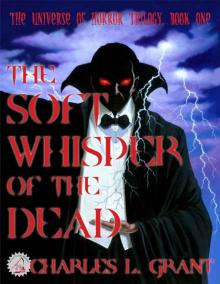 The Universe of Horror Volume 1: The Soft Whisper of the Dead (Neccon Classic Horror)
The Universe of Horror Volume 1: The Soft Whisper of the Dead (Neccon Classic Horror)![[Oxrun Station] Dialing The Wind Read online](http://i1.bookreadfree.com/i/03/19/oxrun_station_dialing_the_wind_preview.jpg) [Oxrun Station] Dialing The Wind
[Oxrun Station] Dialing The Wind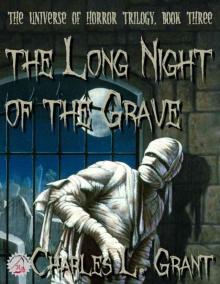 The Universe of Horror Volume 3: The Long Night of the Grave (Neccon Classic Horror)
The Universe of Horror Volume 3: The Long Night of the Grave (Neccon Classic Horror)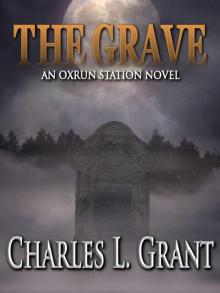 The Grave - An Oxrun Station Novel (Oxrun Station Novels)
The Grave - An Oxrun Station Novel (Oxrun Station Novels)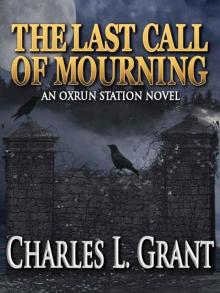 The Last Call of Mourning - An Oxrun Station Novel (Oxrun Station Novels)
The Last Call of Mourning - An Oxrun Station Novel (Oxrun Station Novels)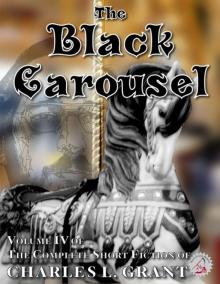 The Complete Short Fiction of Charles L. Grant, Volume IV: The Black Carousel
The Complete Short Fiction of Charles L. Grant, Volume IV: The Black Carousel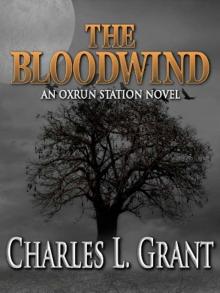 The Bloodwind - An Oxrun Station Novel (Oxrun Station Novels)
The Bloodwind - An Oxrun Station Novel (Oxrun Station Novels)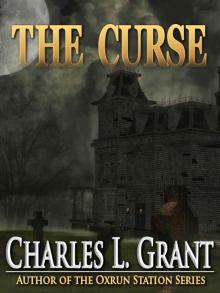 The Curse
The Curse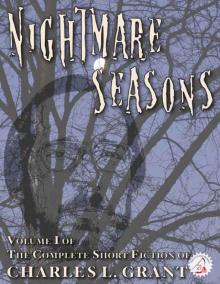 The Complete Short Fiction of Charles L. Grant Volume 1: Nightmare Seasons (Necon Classic Horror)
The Complete Short Fiction of Charles L. Grant Volume 1: Nightmare Seasons (Necon Classic Horror)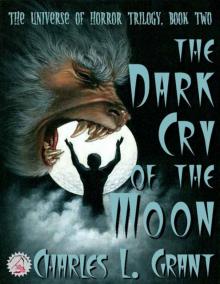 The Universe of Horror Volume 2: The Dark Cry of the Moon (Neccon Classic Horror)
The Universe of Horror Volume 2: The Dark Cry of the Moon (Neccon Classic Horror)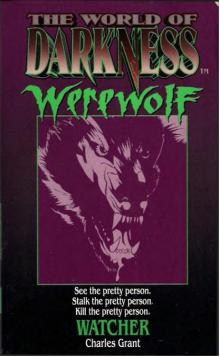 Watcher: Based on the Apocalypse (World of Darkness : Werewolf)
Watcher: Based on the Apocalypse (World of Darkness : Werewolf)![[Oxrun Station] The Bloodwind Read online](http://i1.bookreadfree.com/i/03/25/oxrun_station_the_bloodwind_preview.jpg) [Oxrun Station] The Bloodwind
[Oxrun Station] The Bloodwind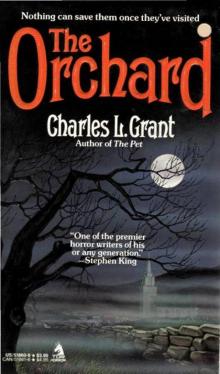 The Orchard
The Orchard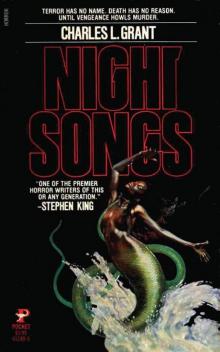 Night Songs
Night Songs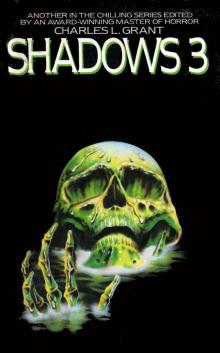 Shadows 3
Shadows 3![Symphony - [Millennium Quartet 01] Read online](http://i1.bookreadfree.com/i1/04/02/symphony_-_millennium_quartet_01_preview.jpg) Symphony - [Millennium Quartet 01]
Symphony - [Millennium Quartet 01]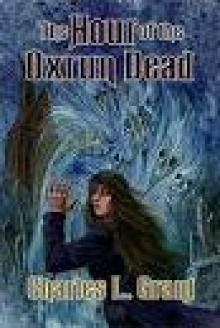 The Hour of the Oxrun Dead (Necon Classic Horror)
The Hour of the Oxrun Dead (Necon Classic Horror)![In the Mood - [Millennium Quartet 02] Read online](http://i1.bookreadfree.com/i1/03/31/in_the_mood_-_millennium_quartet_02_preview.jpg) In the Mood - [Millennium Quartet 02]
In the Mood - [Millennium Quartet 02]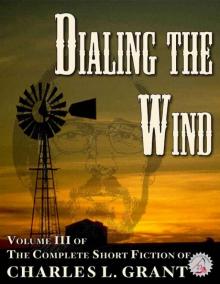 The Complete Short Fiction of Charles L. Grant Volume 3: Dialing the Wind (Neccon Classic Horror)
The Complete Short Fiction of Charles L. Grant Volume 3: Dialing the Wind (Neccon Classic Horror)![[Oxrun Station] The Last Call of Mourning Read online](http://i1.bookreadfree.com/i2/04/05/oxrun_station_the_last_call_of_mourning_preview.jpg) [Oxrun Station] The Last Call of Mourning
[Oxrun Station] The Last Call of Mourning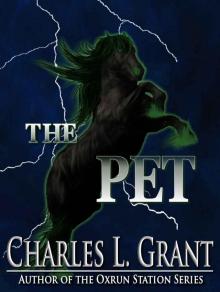 The Pet
The Pet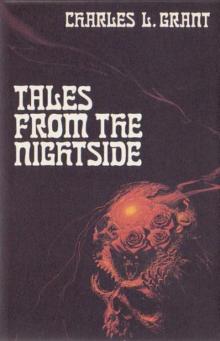 Tales from the Nightside
Tales from the Nightside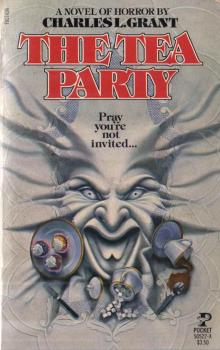 The Tea Party - A Novel of Horror
The Tea Party - A Novel of Horror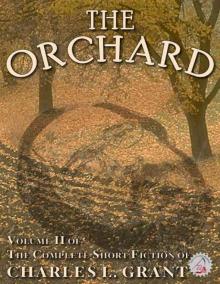 The Complete Short Fiction of Charles L. Grant Volume 2: The Orchard (Necon Classic Horror)
The Complete Short Fiction of Charles L. Grant Volume 2: The Orchard (Necon Classic Horror) Whirlwind
Whirlwind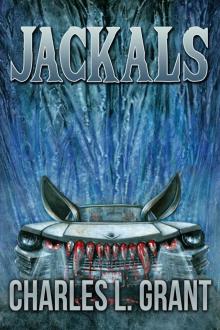 Jackals
Jackals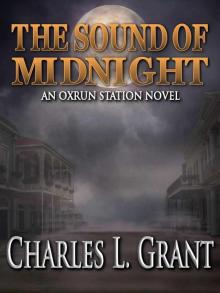 The Sound of Midnight - An Oxrun Station Novel
The Sound of Midnight - An Oxrun Station Novel